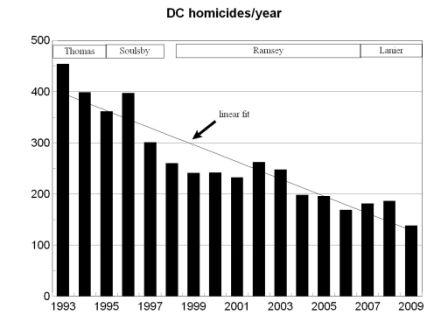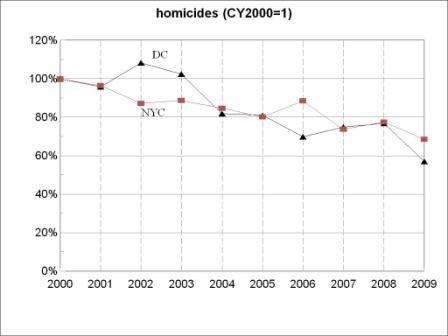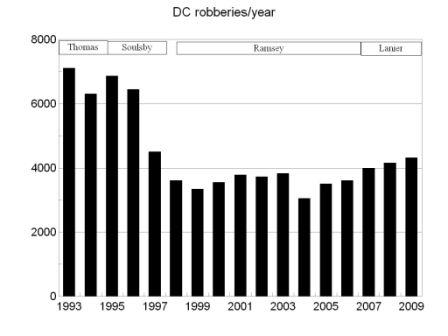Homicides in DC are down. Can the Metropolitan Police
Department take credit for the decrease?
Quoting from a Channel 5 news report:
WASHINGTON - The District is about to end 2009
with the lowest number of murders in 45 years. You have to go back to 1964 to
find a lower number. Murders in the District are down 25 percent.
Why is this happening? It's a phenomenon that has generated a number of theories with several different reasons.
In a one on one interview with Fox 5 Monday, DC Police Chief Cathy Lanier said it all has to do with focusing on a small group
of violent offenders and working closely with the community.
"The first is focusing on those repeat violent gun offenders," said Chief Cathy Lanier in an interview in her office Monday.
"It's a small number of people who consistently carry guns and engage in repeat
violent gun offenses. If you can focus on those people and get them off the street that is the number one key ingredient."
 The second key component, the Chief says, is a good relationship with the community. Building a trust and delivering with
results. "What they've done to prevent the crime this year is they are giving us information continuously on the list serves, email,
calling, talking to the District commander and the beat officer and that helps us put together that intelligence picture."
The second key component, the Chief says, is a good relationship with the community. Building a trust and delivering with
results. "What they've done to prevent the crime this year is they are giving us information continuously on the list serves, email,
calling, talking to the District commander and the beat officer and that helps us put together that intelligence picture."
Well, I won't argue with this
policing methodology: concentrate MPD attention on people known for
violence, and win the trust of the neighborhood so people will come forward with
crime-solving information. That's pretty much policing orthodoxy these days, and
one has to wonder about the implication that these policies weren't being
pursued before Chief Lanier became DC Police Chief (January, 2007). But is
whatever Chief Lanier is doing differently from before her tenure the reason for the decline in homicides?
Let's look at annual homicide data,
1993 to 2009. What's striking is the steady decline in homicides over the past
17 years. The recent counts, including the record low of 2009, may be nothing
new, but merely a continuation of this decades-long trend. There have been four
police chiefs during this period (plus Sonya Proctor, serving as interim chief
for a few months of 1997-1998), as shown by the labels at the top of the chart.
Every police chief since 1993 can claim a decrease in the homicide count during
his or her tenure. Did every police chief initiate new policing policies, each
one improving on the policies of his predecessor? Or was this long decline being
driven by factors entirely outside the realm of police work? The latter is the
more plausible explanation for a decline that continues with little change, year
to year, police chief to police chief.

If this decline in homicides is
due to external factors, rather than whatever is being done in DC, then that
decline might be observed in other cities as well, if they are subject to the
same external influence (the waning of the crack cocaine plague, for example).
The homicide counts for New York City happen to be in hand, and there's a
remarkable similarity in the behavior over the years. The homicide counts in New
York City and DC both peaked in 1990, and have dropped sharply since then, by
80% in New York City, by 70% in DC. As the chart shows, displaying the counts
for New York City and the District normalized to the count for the year 2000,
since that year, the homicide counts for the two cities have followed roughly
the same downward track. Whatever is driving this drop in homicides (and
whatever led to that 1990 peak) is affecting the two cities in much the same
manner. One strong speculation is that the decrease in violent crime
is
due to the reduction in lead in the environment, due to the elimination of lead in paint and in
gasoline, with a 21-year delay, as people exposed to lead as small children grow to
early adulthood. That would explain why this decrease in homicides is observed
nationwide, regardless of local policing policies.
When the police claim credit for a decrease in
crime, I caution them that the inverse may also be true: if crime goes up, then
aren't the police equally responsible? If crime increases, is that due to some
failure in policing? Or are crime rates governed by socioeconomic factors, or
prison term policy, or interventions with troubled youths, or changes in DC
demographics? It seems to me that the police are way too quick to take credit
for any decreases in crime rates, while never taking the blame for any increase
in crime rates. Decreases in crime are always due to their effective police
work; increases, however, are attributed to societal factors over which they
have no control.
Let's look at robbery counts in DC for the same
time period. If effective policing is driving the homicide rate down, shouldn't
the robbery rate also be in decline? Well, it's not. After a striking decrease
in 1996-1997 (thanks to Chief Soulsby?), the robbery count has been roughly
constant, increasing in recent years, to a 2009 count that hasn't been seen
since 1997, a dozen years ago. The trend since 2004 has been a steady
year-to-year increase. While homicides are down by 22% since Chief Lanier became
MPD Chief of Police, robberies are up by 20%.

Well, will the Metropolitan Police take
responsibility for this increase in
crime? I don't think so. And I don't think they should. But similarly, they're
making a mistake in implying that the recent decrease in homicides is due to
their policing strategies. If effective police work is responsible for the
decrease in homicides, then surely the increase in robberies is due to
some deficiency of policing. I have long claimed, for example,
that the District falls short in solving robbery crimes, and getting the
perpetrators out of circulation. Are the police putting so much emphasis on
homicides that they're neglecting robberies?
Or maybe both
homicide and robbery counts are really governed by factors over which the police
have little control. One excellent theory is that the decrease in environmental lead,
most significantly due to the elimination
of leaded gasoline, is responsible for the nationwide decrease in violent crime.
March, 2010: In testimony at the District Council Committee on Public Safety and the
Judiciary, on March 19, Chief Lanier continued to claim credit for the decreasing
homicide count. "The accomplishment that we're most proud of is the dramatic
drop in homicides", she said. "Homicides decreased 23 percent in 2009, far
outpacing the 10 percent decrease nationwide, and far outpacing the 8% drop for
cities of a comparable size to Washington."
Does that mean that the MPD will now accept responsibility for the increase in robberies?
No hint of that, sorry.
Return to home page
Page created December 29, 2009; revised January 2 2010, March 20 2010, March 2 2012

 The second key component, the Chief says, is a good relationship with the community. Building a trust and delivering with
results. "What they've done to prevent the crime this year is they are giving us information continuously on the list serves, email,
calling, talking to the District commander and the beat officer and that helps us put together that intelligence picture."
The second key component, the Chief says, is a good relationship with the community. Building a trust and delivering with
results. "What they've done to prevent the crime this year is they are giving us information continuously on the list serves, email,
calling, talking to the District commander and the beat officer and that helps us put together that intelligence picture."
